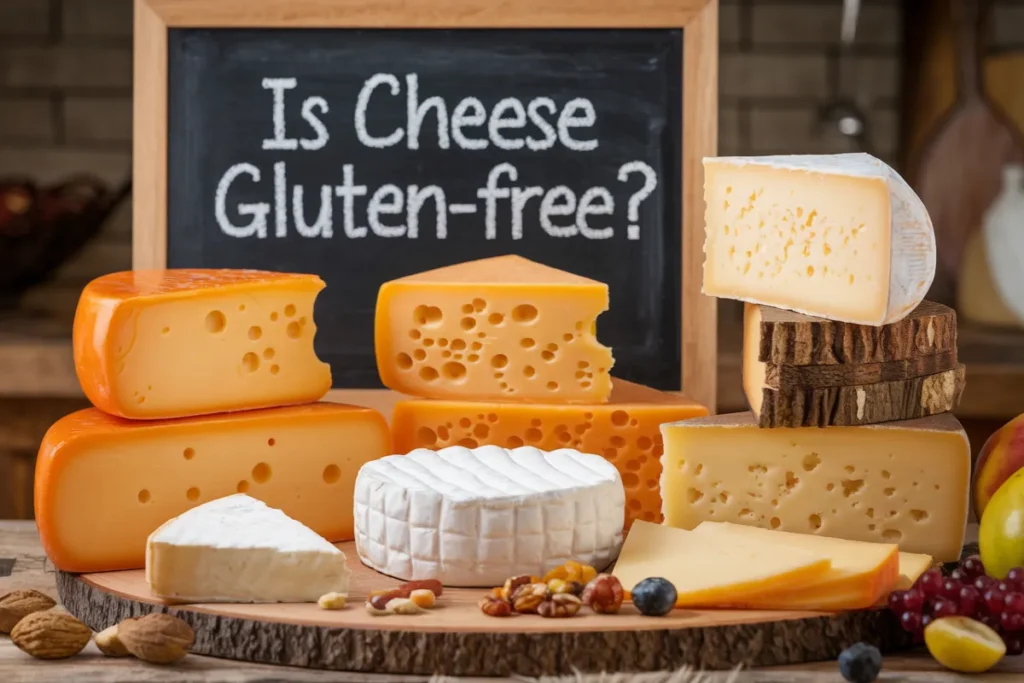For individuals following a gluten-free diet—whether due to celiac disease, gluten intolerance, or personal choice—ensuring that the foods consumed are safe is a top priority. One common question that arises is: Is cheese gluten-free? While cheese is a staple in many diets, especially for those who rely on dairy products for calcium and protein, it can be confusing to determine if all cheeses fit within the gluten-free category.
In this comprehensive guide, we’ll explore everything you need to know about gluten in cheese, from natural cheeses to processed varieties, cross-contamination risks, and tips on choosing safe cheese brands. By the end of this article, you will have a clear understanding of which cheeses are safe for gluten-sensitive individuals and which to avoid.
What Is Gluten and Why Is It a Concern?
Before diving into cheese, it’s important to understand what gluten is and why it’s a concern for some people. Gluten is a protein found in wheat, barley, and rye, and it plays a key role in giving bread and other baked goods their structure. While most people can digest gluten without any problems, some individuals—particularly those with celiac disease or gluten sensitivity—must avoid it.
- Celiac Disease: This autoimmune disorder affects about 1% of the population. When someone with celiac disease consumes gluten, their immune system attacks the lining of their small intestine, leading to serious health problems.
- Non-Celiac Gluten Sensitivity: Some people experience symptoms like bloating, headaches, and fatigue when they eat gluten, even though they don’t have celiac disease. They must also adhere to a strict gluten-free diet to manage their symptoms.
Because gluten is present in many foods, it can be challenging to determine which foods are safe to eat. Cheese is often a gray area, as it’s not immediately clear whether gluten could be hiding in the ingredients or manufacturing process.
Is Cheese Naturally Gluten-Free?
The simple answer is that natural cheeses—those made from basic ingredients like milk, salt, and enzymes—are generally gluten-free. These include popular varieties such as cheddar, mozzarella, gouda, and parmesan. The process of making cheese involves fermenting milk with bacteria, which does not introduce gluten.
Natural cheeses are made from:
- Milk (from cows, goats, sheep, etc.)
- Salt
- Enzymes (such as rennet or microbial enzymes)
None of these ingredients naturally contain gluten. As a result, unflavored and unprocessed cheeses are considered safe for individuals with gluten intolerance or celiac disease.
However, while most natural cheeses are gluten-free, certain varieties of processed cheese or flavored cheese may contain gluten as a result of added ingredients, preservatives, or even cross-contamination during manufacturing.
What About Processed Cheese?
Processed cheeses, which include products like shredded cheese, cheese spreads, or cheese sauces, often contain additional ingredients that help preserve the cheese or improve its texture. These added ingredients may introduce gluten into the product. Some common gluten-containing additives in processed cheese include:
- Modified food starch: Often used as a thickener or stabilizer, this ingredient can sometimes be made from wheat, which contains gluten.
- Maltodextrin: Another thickener that can be derived from wheat.
- Wheat-based anti-caking agents: In shredded cheese, gluten-based agents may be used to prevent the shreds from clumping together.
While some manufacturers use gluten-free alternatives for these additives, it’s crucial to always read the ingredient labels carefully. If you’re unsure whether a processed cheese product is gluten-free, look for products that have been certified gluten-free.
For more tips on how to maintain a gluten-free diet while enjoying your favorite foods, check out this guide to gluten-free zucchini bread, which offers great insights into navigating gluten-free baking.
Common Processed Cheese Products That May Contain Gluten
Here are a few types of processed cheese that may contain gluten:
- Shredded Cheese: As mentioned earlier, shredded cheese may contain anti-caking agents that include gluten.
- Cheese Spreads and Dips: Many cheese spreads contain additives, preservatives, or flavorings that could introduce gluten. Always check the label.
- Pre-Packaged Cheese Slices: These slices often have added ingredients to preserve freshness, some of which could contain gluten.
When in doubt, stick to whole block cheese and shred it yourself to avoid potential gluten contamination. Additionally, look for processed cheese products that are labeled gluten-free or have a gluten-free certification from reputable organizations like the Gluten-Free Certification Organization (GFCO).
Cross-Contamination Risks in Cheese Production
Another concern for people following a gluten-free diet is cross-contamination. Cross-contamination occurs when gluten-containing products are produced in the same facility or on the same equipment as gluten-free products. This can happen with cheese, especially in large factories that process a wide variety of food items.
To reduce the risk of cross-contamination, look for cheese products that are labeled as certified gluten-free. These products are typically produced in gluten-free facilities or on equipment that is thoroughly cleaned to prevent contamination.
You can also find gluten-free certification on products like those used in this gluten-free sourdough bread recipe, which pairs well with your favorite gluten-free cheeses.
Cheese Varieties and Their Gluten-Free Status
Now, let’s take a closer look at popular cheese varieties and whether or not they are gluten-free.
- Hard Cheeses: Cheddar, parmesan, gouda, and gruyère are generally safe as they are made with simple, gluten-free ingredients. These cheeses are rarely processed with additives.
- Soft Cheeses: Cheeses like mozzarella, brie, camembert, and ricotta are also typically gluten-free. However, be cautious of flavored versions of these cheeses.
- Blue Cheese: Some blue cheeses may contain traces of gluten due to the mold cultures used in their production. Though rare, some blue cheese varieties may be started with cultures grown on bread or wheat-based mediums. Check the label or contact the manufacturer to confirm if their blue cheese is gluten-free.
- Cream Cheese and Cottage Cheese: Unflavored versions of cream cheese and cottage cheese are usually gluten-free. However, flavored varieties (such as those with herbs or fruit) may contain gluten-based thickeners or flavorings, so be cautious.
Flavored Cheeses and Gluten
Cheeses that are flavored with spices, herbs, or other seasonings may contain gluten. Ingredients such as soy sauce, malt vinegar, or seasonings can introduce gluten into the product. To ensure safety, look for cheeses that have been clearly labeled as gluten-free or those that list each ingredient in detail. When in doubt, it’s better to avoid flavored cheese and opt for natural varieties.
Certified Gluten-Free Cheese Brands
If you want to eliminate all guesswork, consider purchasing from brands that offer certified gluten-free cheeses. These brands follow strict guidelines to ensure that their products are free from gluten contamination.
Here are a few brands that offer gluten-free options:
- Cabot Creamery: All of their cheeses are naturally gluten-free.
- Organic Valley: This brand produces organic, gluten-free cheeses.
- Tillamook: Known for their cheddar and other block cheeses, most of their products are gluten-free.
- Sargento: Their shredded cheeses are gluten-free, but always double-check the label for additives.
How to Safely Enjoy Cheese on a Gluten-Free Diet
Here are a few tips for safely enjoying cheese while following a gluten-free diet:
- Stick to Natural, Whole Cheeses: Whenever possible, choose natural, unflavored cheese that does not have any added ingredients. These are the safest options.
- Read Labels Carefully: Even though cheese is usually gluten-free, always double-check the ingredient list for additives that may contain gluten.
- Choose Certified Gluten-Free Products: Look for products with a gluten-free certification to ensure that they are safe from cross-contamination.
- Avoid Flavored and Processed Cheese: Flavored cheeses and processed cheese spreads are more likely to contain gluten. Stick to natural varieties or choose certified products.
For more gluten-free ideas to complement your meals, explore these gluten-and-dairy-free dessert recipes that work perfectly alongside your favorite gluten-free dishes.
FAQs About Cheese and Gluten
Is shredded cheese gluten-free?
While many shredded cheeses are gluten-free, some may contain gluten-based anti-caking agents. Always check the label to confirm.
Can I eat blue cheese if I’m gluten-sensitive?
Most blue cheeses are gluten-free, but some may be made with cultures grown on wheat-based mediums. It’s best to verify with the manufacturer.
Are Kraft cheeses gluten-free?
Most of Kraft’s natural cheeses are gluten-free, but always double-check the packaging for gluten-free certification.
Are cream cheeses and cottage cheeses gluten-free?
Unflavored cream cheese and cottage cheese are usually gluten-free. However, flavored varieties might contain gluten-based thickeners or additives.
Conclusion
In general, most natural cheeses are gluten-free, making them a safe and nutritious choice for those on a gluten-free diet. However, processed and flavored cheeses can contain hidden gluten, so it’s important to always read the label and look for gluten-free certification when in doubt. By staying informed and making smart choices, you can continue to enjoy cheese without risking your gluten-free lifestyle.
For more gluten-free recipes and tips, don’t forget to explore Jass Recipes for a wide range of gluten-free options that fit your diet!

